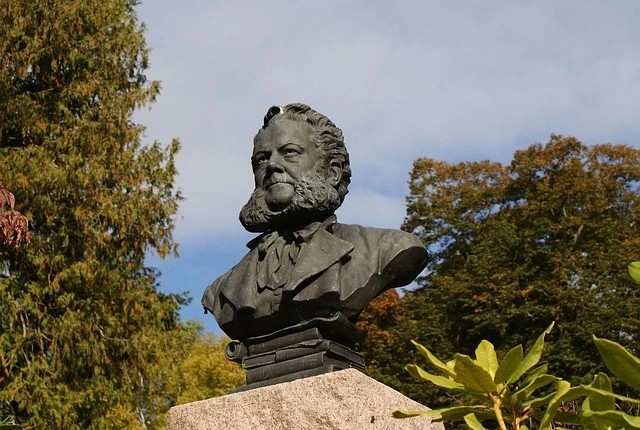Henrik Ibsen is regarded as the founder of modern play. His writings, known for their authentic depiction of psychological struggles, have had a lasting impact on the field of drama. Ibsen’s notable contributions to theatre might be summarised in his innovative method of creating plays, bringing a fresh perspective on moral examination within the context of middle-class realism. This was achieved via a precise and efficient use of action, thought-provoking conversation, and rigorous intellectual exploration.
Ibsen was born in Skien, Norway, in 1828. His early years were characterised by his family’s financial collapse, which had a significant impact on how he saw society and its institutions. This personal history is reflected in his plays, which often explore the struggles of individuals against societal pressures and norms. His first play, Catiline, written at the age of 22, already showcased themes that would recur throughout his career: the rebellious hero and his destructive relationships.
Ibsen’s tenure as director and playwright for the Norwegian Theatre in Bergen was a formative period when he wrote a new play every year. This experience honed his craft and set the stage for his later masterpieces. His major works, including A Doll’s House, Ghosts, Hedda Gabler, and The Master Builder, are celebrated for their critical examination of contemporary social issues and their complex, often tormented, characters. A Doll’s House (1879) is arguably Ibsen’s most famous play, which shocked the bourgeois society of its time with its radical ideas. This play, along with Ghosts (1881), which dealt with the consequences of hidden sins and moral hypocrisy, challenged the dominant norms of 19th-century society and sparked intense debates about the roles of women and the nature of morality.
Ibsen’s Contribution to Modern Drama
The hallmark of Ibsen’s contribution lies in his pioneering use of realism. He introduced a new order of moral analysis set against a rigorously realistic middle-class background, developed with an action economy, penetrating dialogue, and rigorous thought. This approach was a departure from his time’s melodramatic and formulaic plays, which often needed more depth in character development and thematic exploration.
Ibsen’s plays, such as A Doll’s House, Ghosts, An Enemy of the People, and Hedda Gabler, revolutionised the theatrical landscape by presenting complex social and psychological issues within the framework of everyday life. His characters were multi-dimensional, often facing moral dilemmas that challenged the status quo and provoked audiences to introspection. Ibsen’s skillful use of dialogue revealed his characters’ inner thoughts and motivations, making his plays a powerful medium for social commentary. The legacy of Henrik Ibsen is vast, influencing playwrights such as Anton Chekhov and shaping the trajectory of modern theatre.
Moreover, Ibsen’s rejection of traditional theatrical conventions in favour of psychological realism profoundly impacted the development of modern drama. His influence extended beyond the European stage, contributing significantly to the growth of contemporary American drama. His works continue to be performed and studied for their exploration of societal norms, moral dilemmas, and their unique sense of realism.
Major Plays of Henrik Ibsen
Henrik Ibsen, a towering figure in modern theatrical history, is often called the father of realism. His works are pivotal in transitioning from the melodramatic style that dominated European theater to a form that depicts everyday life’s realities. Ibsen’s major plays, such as A Doll’s House, Ghosts, An Enemy of the People, Hedda Gabler, and The Master Builder, among others, have left an indelible mark on the world of drama and continue to be widely studied and performed.
A Doll’s House (1879) is perhaps Ibsen’s most famous work, which challenges the traditional roles of men and women in society. The play’s protagonist, Nora, becomes aware of her subjugated position in a male-dominated world and ultimately seeks independence, a theme that resonated with many and sparked debates on gender equality.
Ghosts (1881) is another significant play that deals with the consequences of societal constraints and moral hypocrisy. It explores the impact of hidden sins and the inevitability of the past catching up with the present, presenting a critical view of the morality of the time.
An Enemy of the People (1882) reflects Ibsen’s concern with the individual’s struggle against the masses. The protagonist, Dr. Stockmann, faces public outrage when he exposes a truth threatening the town’s prosperity, highlighting the conflict between personal integrity and public welfare.
Hedda Gabler (1890) is a psychological drama centered around the eponymous character, a woman trapped in a loveless marriage who manipulates those around her to create a sense of control over her life. This play is often cited for its profound character study and exploration of free will.
The Master Builder (1892) delves into the complexities of ambition, youth, and the fear of ageing. The protagonist, Halvard Solness, is a successful architect who fears being overshadowed by younger, more innovative minds.
Ibsen’s plays are not just stories but explorations of human psychology, societal pressures, and the quest for identity. His ability to intertwine personal dilemmas with broader social issues makes his work timeless and universally relevant. His influence extends beyond the theater and into the realms of literature and philosophy, where his insights into human nature continue to provoke thought and inspire change.
The legacy that Henrik Ibsen left behind is one of challenging and exposing long-standing norms. His plays celebrate the power of theatre to act as a human mirror, reflecting the aspirations and struggles that define each of us individually. Examining his major works again brings to light the eternal nature of great art and the human spirit’s unwavering quest for truth and purpose in a world that is always changing.




Leave a comment